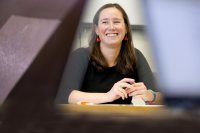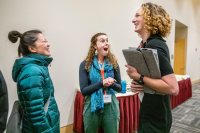
Each spring, college and high school grads throughout the land hear this piece of advice: “Follow your passion!”
But they don’t hear it at Bates, and that’s because the advice is bunk, says Rebecca Fraser-Thill.
And she should know: A lecturer in psychology at Bates and the director of program design for Purposeful Work, Fraser-Thill is an expert in how our work gives meaning and well-being to our lives.
“Do you want to base your whole future on an emotional state?”
And that’s Purposeful Work in a nutshell. Now in its third year of implementation, Purposeful Work gives students a useful and powerful entry into the world of work by helping them figure out — in a highly intentional and programmatic way, from their first through their senior year — what interests them and what they’re good at.
We talked with Fraser-Thill about Bates’ approach to helping students find purposeful work — and what she might offer as better career advice as the Class of 2017 gets ready to graduate on Sunday.
What’s wrong with the typical graduation advice to “follow your passion”?
For one, passion is fleeting. Passion ebbs and flows, just like any other emotional state. Do you want to base your whole future on an emotional state? That seems problematic.
You’ve also said that the call to “follow your passion” can be intimidating for those who don’t immediately have a passion.
Oh, yes. Many students come to me and say they have no passions. And many say they have too many passions. Either way, focusing on a feeling like passion is not going to help students make decisions about majors, or careers, or what they spend their time pursuing.
To say that “you need to have a passion” for any potential interest in order to start exploring it sets the bar way too high for students. But that’s the cultural message we hear: Explore your passion!
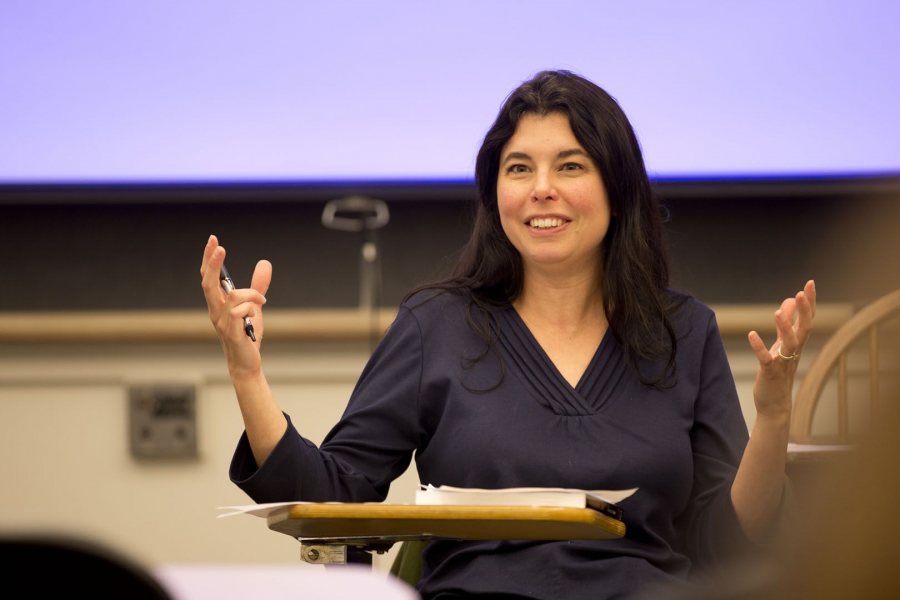
Rebecca Fraser-Thill is director of program design for Purposeful Work and a lecturer in psychology. (Phyllis Graber Jensen/Bates College)
What is better advice than following your passion?
Follow your curiosity and interests. And that’s what we’re doing with Purposeful Work: supporting and guiding students as they follow their curiosity and interests.
Exploring what interests you is a much more stable course and more likely to lead you toward a path that you can commit to over a period of time, rather than jumping from one thing to the next based on the emotion of passion.
It’s been said that if Steve Jobs had followed his passion early in his life, “we would probably find him today as one of the Los Altos Zen Center’s most popular teachers.”
Cal Newport wrote that. I completely agree with his thesis, which is that as we try things out and get better at what we do — as in the case of Steve Jobs — we develop more enthusiasm for what we are doing.
What should Bates grads focus on in the next year?
The coming year is a time of immersion and exploration. For most, it’s the first time they’ll be working for pay on a full-time, long-term basis.
It’s a time to gain a better sense of who you are in the context of work — what truly interests you, what works for you, and what doesn’t. You’re gathering data that you couldn’t gather in college.
When Purposeful Work is implemented across a four-year student cohort, is it the idea that the exploration habit becomes a formal part of the student experience, so they hit the ground running at graduation?
Exactly. Through Purposeful Work, we want students to get better at and more involved in the intentional decision-making process about their work while at Bates. We want them to be aware of how the choices they make — about classes, majors, co-curriculars, athletics, internships, engagement in the community — help them align who they are and what they want to do.
The goal is for them to get good at making these decisions, so when they’re in the work world they can say, “I’ve done this before. I am self-aware. I can make good decisions about what my next job will be.”
How does Purposeful Work do that at Bates?
In the first year, students explore thoughtfully, with support from faculty and staff, what they are interested in.
We all have to explore at some point. Research on identity development tells us that people who do not go through an exploration stage in their lives are much more likely to have a lower sense of purpose than those who have explored and discovered what they are interested in.
“Students test the hypotheses they’ve formed about themselves based on their interests, values, strengths.”
By “thoughtfully,” we mean that we don’t want students to explore everything. It can be helpful when parents or other adults reflect back to our students what excites them. It might be as simple as saying, “Remember that physics class you took as a whim, and you were really excited by it?” This results in selective exploration based on where a student has been already.
Sophomore year begins the processing of narrowing their interests and gaining depth. For instance, you choose a major.
Junior year is about testing interests, trying things out. Students engage in off-campus study and have meaningful summer experiences, including Purposeful Work internships. They develop ideas for senior thesis. Students test the hypotheses they’ve formed about themselves based on their interests, values, strengths.
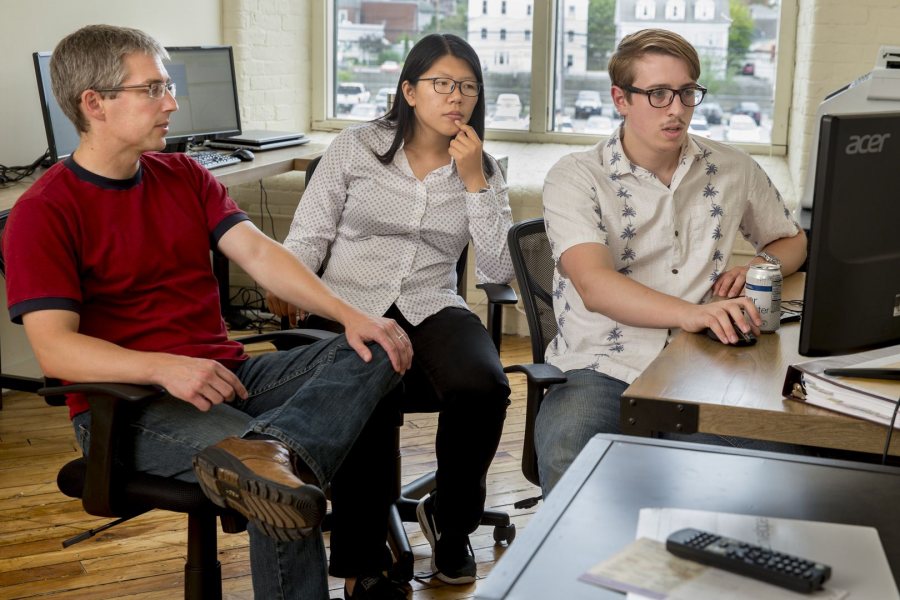
In July 2016, Purposeful Work interns Fan Dong ’17 (second from left) and Michael Varner ’17 (right) work Associate Professor of Economics Nate Tefft in the offices of Looking Glass Investments in Brunswick, a peer-to-peer investment firm where Tefft is executive vice president and chief economist. (Phyllis Graber Jensen/Bates College)
Then comes senior year. That’s the time for students to talk to people. Students now have a sense of all their pieces, but they don’t know how they all fit together. They may be grappling.
Talking with other people is also how people get jobs.
We gain a sense of ourselves and create our narratives through social relationships. That’s how we learn where we’ve been, who were are, where we want to go. We want our seniors to talk to people — family, friends, and especially Bates staff, faculty, and alumni — who’ve had these same puzzles and fit them together in different ways.
Talking and having conversations will serve them internally and externally. It will further their self-knowledge and will be invaluable in interviews and cover letters and other pragmatic ways.
Talking with people is also how we get jobs. It’s been found that about 80 percent of jobs are gained through networking. Talking is about progressing.
When you hear that Bates is helping students find “purposeful work,” it sounds like work that has a social benefit.
Purposeful work is not a type of work.
For example, in 2013, when President Clayton Spencer first outlined the idea of purposeful work at Convocation, she quoted an oral history from a Lewiston shoemaker, who talked about learning to hand-sew shoes: “I used to watch, and I’d say, ‘I can do the same thing.’ And then from there I picked up the tricks that my dad used to show me, then I picked up some others, then after that, I loved it.”
So that’s an example of purposeful work because it has meaning for the individual.
Some people believe that finding purposeful work would just be icing on the cake of their lives. But there’s more at stake, isn’t there?
Yes, and the most compelling research is by Gallup. They surveyed thousands of people in 150 countries to dig into what creates well-being, what makes a person feel good. They found four types of important well-being around the world: physical, financial, social, and community well-being.
Finding purposeful work in our lives is not icing on the cake. It is not even the cake. It is the meal; it is the sustenance.
That makes intuitive sense. But Gallup wanted to know how we get those four qualities. Well, they found a fifth type of well-being, which they initially called “career well-being” and now call “purpose well-being.” It is defined as the endeavors that fill our day, paid or not, and Gallup found that a person’s purpose well-being is highest when they like what they are doing every day and are using their strengths every day.
Here’s the kicker: People who were high in purpose well-being are twice as likely to be high in these four other types of well-being. So, finding purposeful work in our lives is not icing on the cake. It is not even the cake. It is the meal; it is the sustenance. Purpose matters.
I’m curious about the link between finding meaning in work and finding pleasure in work. Can someone say that their work is meaningful but not always pleasurable?
Absolutely. That’s key. Pleasure in work does not equate with finding meaning in work. Sometimes your most meaningful activities can be low in pleasure. Parenting is an example. A day with the kids can be incredibly meaningful but not always pleasurable, especially if there’s bickering!
A sense of purpose is greater than pleasure. There are two concepts of well-being: hedonic and eudaimonic. The former is about finding pleasure, but there’s the “hedonic treadmill.” We can’t get enough. We want more and more pleasure.
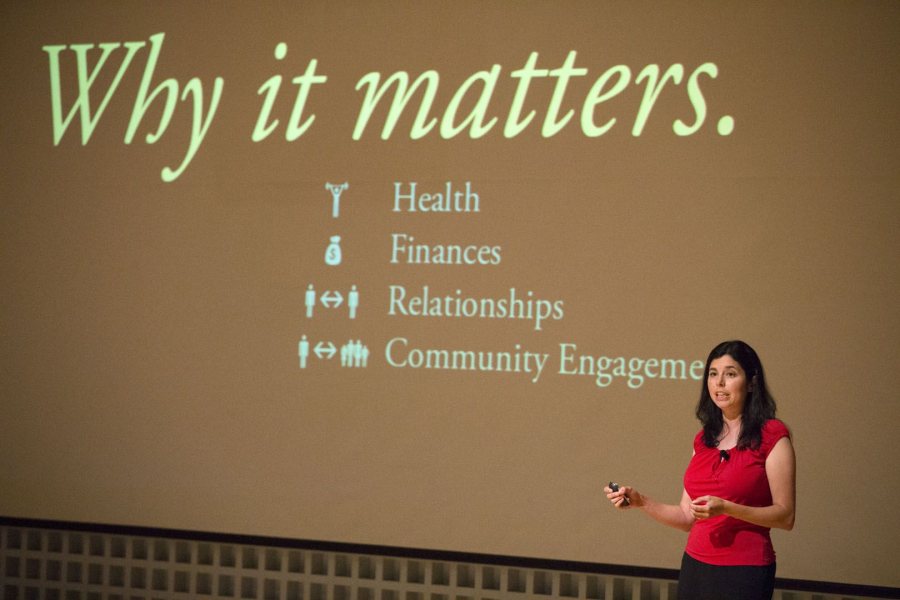
During Orientation last August, Rebecca Fraser-Thill talks about Purposeful Work with parents of students in the Class of 2020. (Phyllis Graber Jensen/Bates College)
Eudaimonic well-being, on the other hand, is about meaning, purpose, richness, and life satisfaction, and it comes from building a life that has a variety of layers and textures to it. We know that doing purposeful work that is aligned between who you are and what you do is at the core, too. And that well-being is lasting; you’re not chasing it.
Why are the liberal arts the perfect launching pad for Bates’ brand of purposeful work and the alignment of self and work?
I believe this to the core. The liberal arts allow you a space to try out a variety of interests and skill sets and explore things you didn’t even know existed until you came to campus.
You get to explore with incredibly engaged faculty members who know the content deeply because they have explored and followed their interests and curiosities so far that they are — I’m not going to say “passionate”! — deeply driven. It wakes them up in the morning to teach, do research, and work in the community.
The liberal arts enable self-reflection on an ongoing basis and exploration to test that self-reflection and see where it takes you.
Where does the Bates motto, Amore ac Studio, “With Ardor and Devotion,” come in?
Purposeful Work is all about making Amore ac Studio motto a lived reality for our students. By exploring widely, based on their curiosity, and then digging deeply into a topic or field based on their developing strengths and interests, students can work with ardor and devotion, both while at Bates and long after they leave.
